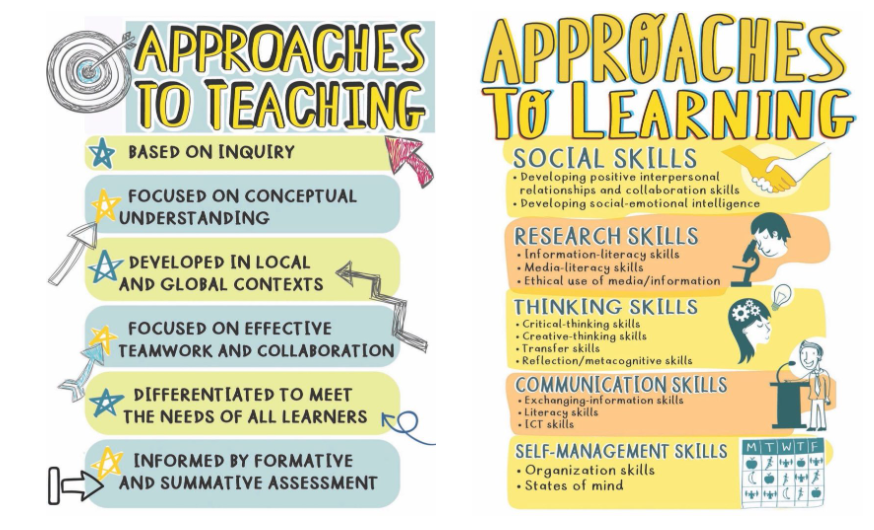An IB education is holistic in nature – it is concerned with educating the whole person.
The International Baccalaureate®️ (IB) programmes aim to do more than other curricula. IB programmes develop inquiring, knowledgeable and caring young people who are motivated to succeed. The IB programmes gives students distinct advantages by building their critical thinking skills, nurturing their curiosity and their ability to solve complex problems.
The aim of all IB programmes is to develop internationally minded people who, recognizing their common humanity and shared guardianship of the planet, help to create a better and more peaceful world.
We strive to develop students who will build a better world through intercultural understanding and respect, alongside a healthy appetite for learning and excellence.
IB programme frameworks can operate effectively with national curricula across all school ages; more than half of IB World Schools are state-funded.
The IB’s programmes are different from other curricula because they:
- Encourage students of all ages to think critically and challenge assumptions;
- Develop independently of government and national systems, incorporating quality practice from research and our global community of schools;
- Encourage students of all ages to consider both local and global contexts;
- Develop multilingual students.
Quality Practice
IB programmes incorporate quality practice from national and international research and the IB global community. They encourage students to be internationally-minded, within a complex and hyper-connected world.
Students Learn How to Learn
Throughout all IB programmes, students develop approaches to learning skills and the attributes of the IB learner profile. The IB learner is positively challenged to think critically and to learn in a flexible environment crossing disciplinary, cultural and national boundaries.
IB students take responsibility for their own learning and understand how knowledge itself is constructed, underpinned by theory of knowledge (TOK) course.
IB programmes help students:
- Ask challenging questions;
- Think critically;
- Learn across disciplines;
- Develop research skills proven to help them in higher education;
- IB programmes also encourage students to be active in their communities and to take their learning beyond academic study.

IB Learner Profile
The IB learner profile represents 10 attributes valued by IB World Schools. We believe these attributes, and others like them, can help individuals and groups become responsible members of local, national and global communities.
As IB learners we strive to be:
Inquirers
We nurture our curiosity, developing skills for inquiry and research. We know how to learn independently and with others. We learn with enthusiasm and sustain our love of learning throughout life.
Open-Minded
We critically appreciate our own cultures and personal histories, as well as the values and traditions of others. We seek and evaluate a range of points of view, and we are willing to grow from the experience.
Knowledgeable
We develop and use conceptual understanding, exploring knowledge across a range of disciplines. We engage with issues and ideas that have local and global significance.
Caring
We show empathy, compassion and respect. We have a commitment to service, and we act to make a positive difference, in the lives of others and in the world around us.
Thinkers
We use critical and creative thinking skills to analyse and take responsible action on complex problems. We exercise initiative in making reasoned, ethical decisions.
Risk-Takers
We approach uncertainty with forethought and determination; we work independently and cooperatively to explore new ideas and innovative strategies. We are resourceful and resilient in the face of challenges and change.
Communicators
We express ourselves confidently and creatively in more than one language and in many ways. We collaborate effectively, listening carefully to the perspectives of other individuals and groups.
Balanced
We understand the importance of balancing different aspects of our lives intellectual, physical and emotional to achieve well-being for ourselves and others. We recognize our interdependence with other people and with the world in which we live.
Principled
We act with integrity and honesty, with a strong sense of fairness and justice, and with respect for the dignity and rights of people everywhere. We take responsibility for our actions and their consequences.
Reflective
We thoughtfully consider the world and our own ideas and experience. We work to understand our strengths and weaknesses in order to support our learning and personal development.
At St. Nicholas School we equip our learners with the skills they need now to make a difference to themselves, others and the world.
At St. Nicholas School we equip our learners with the skills they need now to make a difference to themselves, others and the world.
St. Nicholas is an IB School since 2000
Our schools, St. Nicholas Pinheiros and St. Nicholas Alphaville are authorised by the IB Organization to offer its programmes. Ready More at IB website for:
St. Nicholas School Pinheiros: https://ibo.org/school/001263/
St. Nicholas School Alphaville: https://ibo.org/school/060102/
Correlation between St Nicholas and IB programs:
Age | St. Nicholas Years | St. Nicholas Programmes | IB Programmes |
|---|---|---|---|
1.6 – 2 | TinyTots 1 | Early Years Programme | – |
2 – 3 | TinyTots 2 | – | |
3 – 4 | Nursery | – | 
|
4 – 5 | Kindergarten 1 | ||
5 – 6 | Kindergarten 2 | ||
6 – 7 | Grade 1 | ||
7 – 8 | Grade 2 | ||
8 – 9 | Grade 3 | ||
9 – 10 | Grade 4 | ||
10 – 11 | Grade 5 | ||
11 – 12 | Grade 6 | – | 
|
12 – 13 | Grade 7 | ||
13 – 14 | Grade 8 | ||
14 – 15 | Year 9 | ||
15 – 16 | Year 10 | ||
16 – 17 | Year 11 | – |  (Pinheiros e Alphaville Campus) |
17 – 18 | Year 12 |
*Only schools authorized by the IB Organization can offer any of its four academic programmes: the Primary Years Programme (PYP), the Middle Years Programme (MYP), the Diploma Programme, or the Career-related Programme (CP).
